Films reviewed: “3 Hearts”, “10,000 km” (pictured above), “Casa grande”, “Güeros”, “Hungry Hearts”, “The Way He Looks”, “Wild Life”, “The Wonders” and “X + Y”.
London Film Festival 2014 was split into strands, with this blog post covering Journey and Love. It seemed appropriate to group them together even though it doesn’t really make sense when I think about it too much. Come back in the next few days to read about Cult
London Film Festival 2014 was split into strands including Cult, Dare, Debate, First Feature, Galas, Laugh, Official Competition, Sonic and Thrill. However, this post covers Journey and Love, two sections I’ve grouped together because it seemed vaguely appropriate. Not sure why as the journey usually comes out of losing love, but let’s not focus too much on that. I had to miss the Journey Gala (Winter Sleep) because of a work assignment, but let it be known that I skipped the Love Gala (A Little Chaos) deliberately.
If I had more time and fewer clashes, I would have caught Jauja, Far From Men and Love is Strange. Maybe next year, right? Or maybe when they come out in the next year. Anyway, here are the reviews…
3 Hearts – 5/10
Original title: 3 coueurs
Director: Benoît Jacquot
Writers: Julien Boivent, Benoît Jacquot
Starring: Charlotte Gainsbourg, Benoît Poelvoorde, Chiara Mastroianni, Catherine Deneuve
Strand: Love
“Where is the invisible man?”
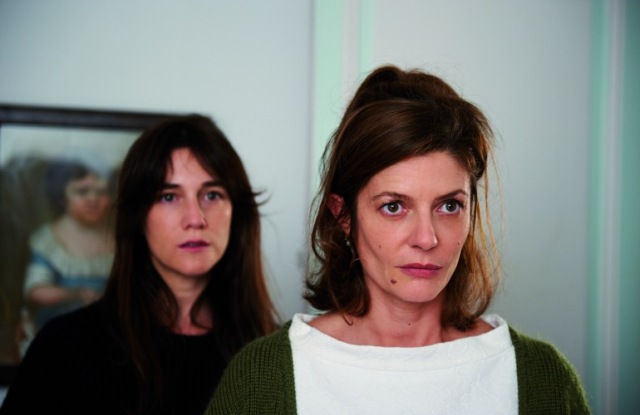 Why stop at two hearts when you can have three? I was going to complain that 3 Hearts is a tired story that gets recycled too often, but actually I can’t remember when I last saw a film tackle a love triangle with so little interest in adding anything new. Well, I suppose it does at least boast an implausible coincidence that allows two sisters (Gainsbourg and Mastroianni) to fall in love with the same man (Poelvoorde) through their own separate meet-cutes. The unlikely predicament is part of the film’s roots in melodrama – you can hear the strings a few streets away – but doesn’t make full use of a talented cast other than demonstrating they deserve medals for being able to cry on cue. Although I suppose that’s what acting awards are.
Why stop at two hearts when you can have three? I was going to complain that 3 Hearts is a tired story that gets recycled too often, but actually I can’t remember when I last saw a film tackle a love triangle with so little interest in adding anything new. Well, I suppose it does at least boast an implausible coincidence that allows two sisters (Gainsbourg and Mastroianni) to fall in love with the same man (Poelvoorde) through their own separate meet-cutes. The unlikely predicament is part of the film’s roots in melodrama – you can hear the strings a few streets away – but doesn’t make full use of a talented cast other than demonstrating they deserve medals for being able to cry on cue. Although I suppose that’s what acting awards are.
10,000 km – 8/10
Director: Carlos Marques-Marcet
Writers: Carlos Marques-Marcet, Clara Roquet
Starring: David Verdaguer, Natalia Tena
“Can we talk about something other than our relationship?”
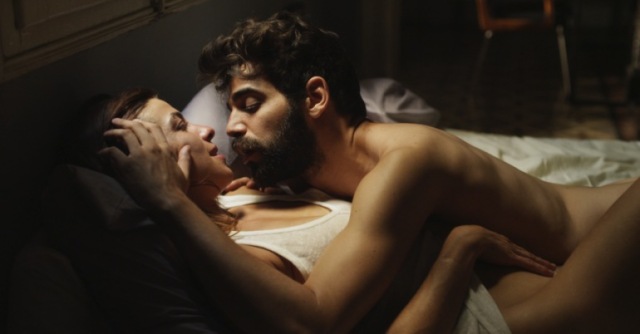 Beginning with a 20-minute unbroken shot in which a couple have sex before brushing their teeth in separate rooms, Carlos Marques-Marcet crafts a subtly inventive drama full of low-key surprises and emotional ingenuity. 10,000 km might be the first worthwhile attempt to portray a crumbling long-distance relationship in the internet age (usually a predictable narrative), and puts Like Crazy to shame by establishing a believable chemistry that travels across the air miles separating Spain and America..
Beginning with a 20-minute unbroken shot in which a couple have sex before brushing their teeth in separate rooms, Carlos Marques-Marcet crafts a subtly inventive drama full of low-key surprises and emotional ingenuity. 10,000 km might be the first worthwhile attempt to portray a crumbling long-distance relationship in the internet age (usually a predictable narrative), and puts Like Crazy to shame by establishing a believable chemistry that travels across the air miles separating Spain and America..
In the opening scene, Sergi (David Verdaguer) and Alex (Natalia Tena) have sex, eat breakfast, and geographically end their Barcelona-based relationship. Alex, a photographer by trade, admits (between sips of orange juice) that she’s been offered a year-long contract in LA and plans to accept. Sergi is helpless in holding onto her, even with the emotional manipulation of playing The Magnetic Fields’ “Nothing Matters When We’re Dancing”, and so begins the next stage: regular communication via webcam, Facebook messages, and using Google Maps to pretend he’s walking in his long-distance lover’s footsteps.
I’ve often been sceptical about directors holding Skype auditions – it’s not too far away from “phoning” in a performance. But 10,000 km has shown me the light. Sergi and Alex are able to hold intimate conversations through their computers by eating dinner together, cooking together, and maintaining an endearing warmth that makes it (at first) a pleasure to share their company. Their natural spark is palpable, even when apart, and each actor generates natural enthusiasm for speaking to a glitchy image on a laptop screen.
10,000 km forms its own pattern whereby each online chat has a time stamp and alternates in whose side the viewer sits. Alex cooks food for friends in a brightly lit LA flat, while Sergi dissolves into a despondent alcoholic who browses social media in the dark. Jokes about emailing a baby are no longer funny within the context of their relationship 2.0; their separate Venn diagrams reveal different priorities. It’s also devastatingly effective (and affective) to witness both sides, scene by scene, wholly reliant on a broadband connection for emotional security. When they dance together by cradling their laptops, it’s like the sex scene in Her without any shred of deliberate weirdness or humour.
Despite a Google Maps chase sequence more riveting than any of the Bourne films, it all boils down to that very first scene. When Alex prepares breakfast in the kitchen, Sergi walks in from the bathroom, still brushing his teeth, just to be physically close to her. As she later says, there’s a difference between wanting to be with someone, and wanting them to be there.
Casa Grande – 9/10
Director: Fellipe Barbosa
Writers: Mauro Pizzo, Karen Sztajnberg, Fellipe Barbosa
Starring: Thales Cavalcanti, Marcello Novaes, Suzana Pires,
Strand: Love
“They think they own the streets.”
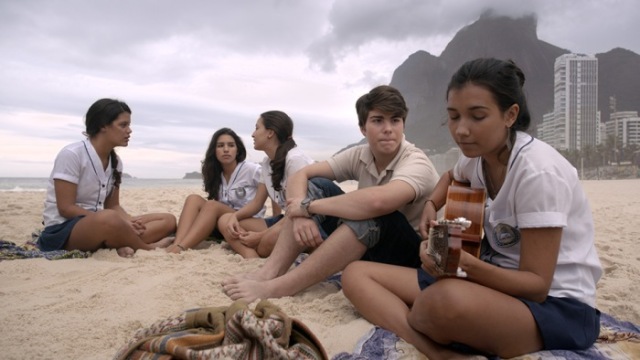 A triggered security alarm at the titular “casa grande” sparks Hugo (Marcello Novaes) into the mode of protective father as he tiptoes by the swimming pool hunting for an intruder. Instead of a baseball bat, Hugo’s weapon of choice is a pristine, state-of-the-art golf club. Casa grande is furnished with these symbols of wealth, each owned by a father aware the money’s drying up – but even more fearful someone will find out. However, the Brazilian coming-of-age tale is centred on his teenage son, Jean (Thales Cavalcanti), who’s eager to escape his family’s privileged, insular lifestyle. With sweet humour and bitter political truths, Felliber Barbosa imbues his first narrative feature with a personal touch, fuelled by autobiographical minutiae and an ensemble cast encapsulating a class struggle in denial.
A triggered security alarm at the titular “casa grande” sparks Hugo (Marcello Novaes) into the mode of protective father as he tiptoes by the swimming pool hunting for an intruder. Instead of a baseball bat, Hugo’s weapon of choice is a pristine, state-of-the-art golf club. Casa grande is furnished with these symbols of wealth, each owned by a father aware the money’s drying up – but even more fearful someone will find out. However, the Brazilian coming-of-age tale is centred on his teenage son, Jean (Thales Cavalcanti), who’s eager to escape his family’s privileged, insular lifestyle. With sweet humour and bitter political truths, Felliber Barbosa imbues his first narrative feature with a personal touch, fuelled by autobiographical minutiae and an ensemble cast encapsulating a class struggle in denial.
Barely hidden by tall villa gates, the lavish house signifies what was at least once a comfortable living. Hugo and his wife, Sonia (Suzana Pires), raise Jean and his younger sister (Alice Melo) with strict curfews, Catholic school, and a general upbringing that hides them from a poorer side of the Rio neighbourhood. The home itself is systematic of an economic and racial divide, given how they employ a live-in housekeeper, maid and chauffeur to carry out chores. That might be why Jean isn’t perspicacious enough to recognise why his father storms into his bedroom at night to switch off the air-conditioning – it’s only because of a mounting debt. Considering the household remains unchanged in its surface, the lie is both internal and external.
When Hugo notifies his son that the family’s personal driver has taken an unexpectedly long holiday – covering up a moneysaving dismissal – the subsequent bus journeys are welcomed by Jean to meet other people. (Specifically, people of the female variety.) Beforehand, Jean’s only escape from his parents’ control came from flirtatious visits to housekeeper Rita’s (Clarissa Pinheiro) room after dark for the kind of conversations that wouldn’t exactly take place in the living room (“dream of me – I’m washing your sheets tomorrow”) before she sends him away. This pent up frustration explains how quickly Jean starts a relationship with another bus passenger, Luiza (Bruna Amaya), a mixed-race student at a less privileged school benefitting from the country’s installed quota law. The pair share an intimacy in which Jean explores a bit more than just biological urges, ultimately questioning the morals of his own upbringing.
At times, Barbosa’s political view comes across a bit too directly through his characters, primarily during classroom discourse and a fiery social event in which Luiza furiously informs Hugo, “Quotas are meant to correct a historic debt towards blacks… quotas are approved federally and you lost that one.” After initially finding these scenes too heavy-handed, I’ve started to sway the other way. It’s at that age when young minds are easily influenced by authoritative voices, so of course Jean would pay extra attention to a school teacher or a girl on whom he has a crush. With a new-found middle-class guilt burgeoning upon his carefree life, he recognises the problem might not just be under his roof, but what’s connected to the roof itself.
Part of the combative energy emerges from casting established telenovelas stars as the adults, while sourcing first-time actors for the junior roles. Barbosa clearly sympathises with his younger counterparts, and even when to his former school to pluck Cavalcanti for the role of Jean. Given Casa grande has its own subtitle of The Ballad of Poor Jean, it’s hard not to see elements of The 400 Blows in how the young protagonist runs away in search of a new environment, without turning his neck back towards the “casa grande” or its swimming pool the parents can no longer afford. Even if the house towers prominently in the neighbourhood, its facade is crumbling.
Güeros – 4.5/10
Director: Alonso Ruizpalacios
Writers: Gibrán Portela, Alonso Ruizpalacios
Starring: Sebastián Aguirre, Tenoch Huerta, Leonardo Ortizgris
Strand: Journey
“I combed my hair. I used gel thinking it would be a good day.”
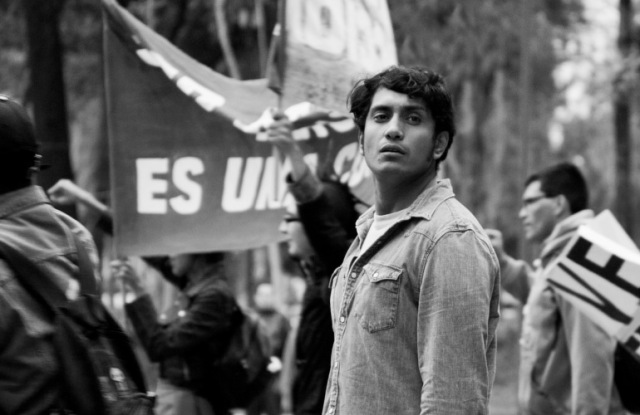 According to a dictionary introduction, “Güeros” is the definition of someone with blond hair or light skin. It’s also the name of Alonso Ruizpalacios’ energetic debut that’s full of visual flair without adding up to much. Güeros begins with a misdirected water-balloon, and keeps the misdirection flowing. Tomás (Sebastián Aguirre) is punished by his mother and sent to stay with his brother Sombra (Tenoch Huerta) at university during a strike. However, Sombra and his friend (Leonardo Ortizgris) are “taking a strike from the strike” (easily the script’s best line) to instead embark on a road trip in search of a musician who once made Bob Dylan cry.
According to a dictionary introduction, “Güeros” is the definition of someone with blond hair or light skin. It’s also the name of Alonso Ruizpalacios’ energetic debut that’s full of visual flair without adding up to much. Güeros begins with a misdirected water-balloon, and keeps the misdirection flowing. Tomás (Sebastián Aguirre) is punished by his mother and sent to stay with his brother Sombra (Tenoch Huerta) at university during a strike. However, Sombra and his friend (Leonardo Ortizgris) are “taking a strike from the strike” (easily the script’s best line) to instead embark on a road trip in search of a musician who once made Bob Dylan cry.
The aimless joviality is a mixture of Godard (mainly Breathless) and Jarmusch (mainly Coffee and Cigarettes) without committing to either. Ruizpalacious is inventive with crisp black-and-white cinematography that spins in circles or gives way to the hypnotic beat of slackers munching carrots. But for 106 minutes, Güeros struggles to maintain any momentum and demonstrates why Jarmusch limited each Coffee and Cigarettes segment to 10 minutes. The characters are mere props, which isn’t really excused by a meta-joke in which the director makes a cameo to request feedback. With false humility, the fourth wall is playfully shattered to reveal the “chase movie” isn’t really chasing anything. I guess they’re happy enough to be on strike.
Hungry Hearts – 7/10
Director/Writer: Saverio Costanzo
Starring: Adam Driver, Alba Rohrwacher, Roberta Maxwell
Strand: Love
“She’s not crazy. She’s just… unusual.”
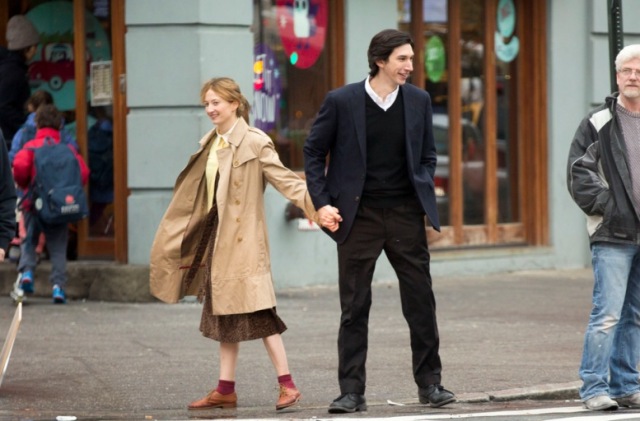 A New York relationship drama called Hungry Hearts? It’s not what you expect. The English-language debut from Saverio Costanzo begins with a comical nosebleed, morphs into Rosemary’s Baby, and closes on… well, I won’t spoil it for you. Jude (Adam Driver) and Mina (Able Rohrwacher) are an affectionate couple with a shared sense of humour who fall in love when locked inside the unromantic bathroom of a Chinese restaurant. But love movies in mysterious ways: they marry, have a son, and it’s soon husband versus wife regarding the infant’s dietary habits. The crux: will the 3-month-old be raised a vegetarian like its parents? You’ll be surprised by the ensuing emotional mileage that borders on the horror genre.
A New York relationship drama called Hungry Hearts? It’s not what you expect. The English-language debut from Saverio Costanzo begins with a comical nosebleed, morphs into Rosemary’s Baby, and closes on… well, I won’t spoil it for you. Jude (Adam Driver) and Mina (Able Rohrwacher) are an affectionate couple with a shared sense of humour who fall in love when locked inside the unromantic bathroom of a Chinese restaurant. But love movies in mysterious ways: they marry, have a son, and it’s soon husband versus wife regarding the infant’s dietary habits. The crux: will the 3-month-old be raised a vegetarian like its parents? You’ll be surprised by the ensuing emotional mileage that borders on the horror genre.
When Mina is informed by a psychic to expect an “indigo child” – a being with inherent supernatural powers – she tightly controls and underfeeds the baby for the first few months of its life, never allowing it to experience sunlight. Jude, bewildered, eventually sneaks their son to a doctor to find out the boy’s in danger of malnutrition. That’s when Hungry Hearts transitions into an over-the-top battle of two control freaks who love each other – but not necessarily enough for extreme circumstances. It’s not a healthy relationship: Jude secretly feeds the child at church, while Mina shrinks into a ghost; the size difference between Driver and Rohrwacher is especially apt. “My son threw up meat,” she complains, with the chosen pronoun signifying the split.
Costanzo is especially playful with a camera that uncomfortably zooms in on faces, occasionally switching to a paranoid goldfish bowl lens. The sound design amps up the menace of street traffic and industrial neighbours; inside, claustrophobia sets in. In a supporting role, Jude’s mother (Roberta Maxwell) intrudes and adds to the rallying voices fearful of Mina’s New Age mothering philosophy. The baby, however, is just an unfortunate passenger. The unusual direction won’t be for everyone – judging by the heavy sighing in the screening – but Hungry Hearts is the most distinctive, haunting food fight I’ve seen in quite a while.
The Way He Looks – 8.5/10
Original title: Hoje Eu Quero Voltar Sozinho
Director/Writer: Daniel Ribeiro
Starring: Ghilherme Lobo, Fabio Audi, Tess Amorim
Strand: Love
“Imagine an eclipse. The moon is still there.”
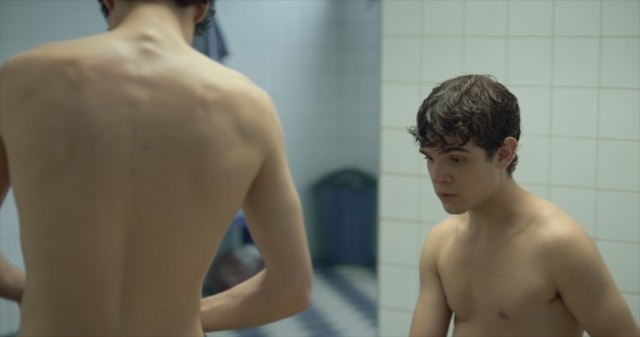 I swore after God Help the Girl that I would never, ever listen to Belle & Sebastian again. I was close to deleting every MP3 from my laptop, but sometimes certain music is unavoidable, especially when you’re at a screening for a film that keepings playing “There’s Too Much Love”. For Leo (Lobo), a lonely blind teen, the song represents a comforting pleasure for when he’s stuck at home, but the 4-minute tune evolves into an anthem for first love. The Way He Looks didn’t just bring me close to tears; it made me forgive Stuart Murdoch.
I swore after God Help the Girl that I would never, ever listen to Belle & Sebastian again. I was close to deleting every MP3 from my laptop, but sometimes certain music is unavoidable, especially when you’re at a screening for a film that keepings playing “There’s Too Much Love”. For Leo (Lobo), a lonely blind teen, the song represents a comforting pleasure for when he’s stuck at home, but the 4-minute tune evolves into an anthem for first love. The Way He Looks didn’t just bring me close to tears; it made me forgive Stuart Murdoch.
Ribeiro’s beguilingly charming coming-of-ager centres on Leo’s friendship triangle, if such a term exists. He and Giovana (Amorim) are best buds; they hang out together all the time, wondering why they’ll never be kissed and just generally enjoying each other’s company – because no one can come between them, not even the new handsome boy at school with curly hair who causes a flutter among all the girls. Right? Well, Fabio (Audi) and his luscious locks befriend Leo, not Giovana, causing a rift and a bit of something else. Through blindness, Leo discovers romantic feelings for Fabio in a manner rarely seen in films: he doesn’t resort to judging physical appearances.
The cast share an endearing chemistry that also becomes a story of underdogs standing up to bullies and overcoming adolescent pains to discover what they want from life. It turns out they want love, friendship, and everything else mentioned in early Belle & Sebastian lyrics.
Wild Life – 4/10
Original title: Vie sauvage
Director: Cédric Kahn
Writers: Cédric Kahn, Nathalie Najem
Starring: Mathieu Kassovitz, Céline Sallette
Strand: Love
“We’ve nothing left.”
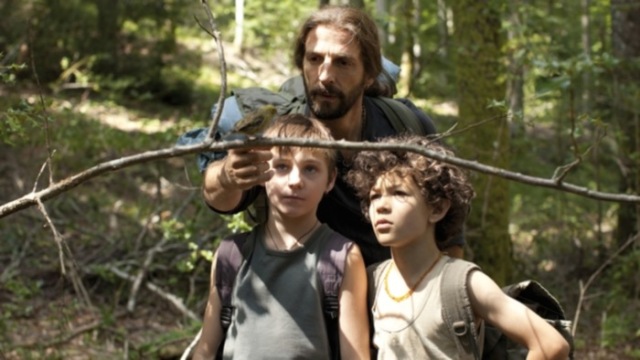 Despite a promising storyline – a divorced father kidnaps his children and raises them away from the evils of capitalism – there’s little to remember about Wild Life other than a few seconds when the father holds his children before a sunset, insisting, “We’ve nothing left.”
Despite a promising storyline – a divorced father kidnaps his children and raises them away from the evils of capitalism – there’s little to remember about Wild Life other than a few seconds when the father holds his children before a sunset, insisting, “We’ve nothing left.”
The Wonders – 8/10
Original title: La Meraviglie
Director/Writer: Alice Rohrwacher
Starring: Alexandra Lunghi, Sam Louvyck, Alba Rohrwacher, Monica Bellucci
Strand: Journey
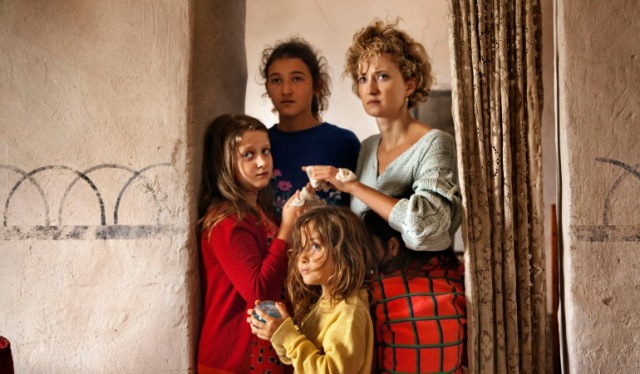 When making honey stops making money, what’s a girl to do? Enter her family into a reality TV called Countryside Wonders, of course. Also, I interviewed the director and asked her if the Earth is dying.
When making honey stops making money, what’s a girl to do? Enter her family into a reality TV called Countryside Wonders, of course. Also, I interviewed the director and asked her if the Earth is dying.
X + Y – 3/10
Director: Morgan Matthews
Writer: James Graham
Starring: Asa Butterfield, Sally Hawkins, Rafe Spall
Strand: Love
“I don’t even enjoy it, maths. What’s the point?”
 In a packed press screening, I was possibly the only person not charmed (judging by the onslaught of laughter) by X + Y. The story concerns an autistic boy with a dead father, a stressed mother, and an ambition to be a notable mathematician. It’s also a narrative that’s somehow nauseatingly calculated to please audiences, while also a complete mess in how it tosses out subplots without any disregard. Perhaps I should stress that I was clearly in the minority; the room found every lousy joke funny, and even chuckled at non-comedic scenes of Asian culture. It’ll probably secure excellent reviews when it comes out, but you’ll have to trust the negative integer on this one.
In a packed press screening, I was possibly the only person not charmed (judging by the onslaught of laughter) by X + Y. The story concerns an autistic boy with a dead father, a stressed mother, and an ambition to be a notable mathematician. It’s also a narrative that’s somehow nauseatingly calculated to please audiences, while also a complete mess in how it tosses out subplots without any disregard. Perhaps I should stress that I was clearly in the minority; the room found every lousy joke funny, and even chuckled at non-comedic scenes of Asian culture. It’ll probably secure excellent reviews when it comes out, but you’ll have to trust the negative integer on this one.
Follow @halfacanyon for more.


Pingback: LFF14 Debate, Thrill & First Feature: “Rosewater”, “Camp X-Ray”, “The Tribe”, “The Face of an Angel” and 6 others… | HALF A CANYON FILM BLOG: A traffic jam when you're already a plate
Pingback: LFF14 Cult & Sonic reviews: “Eden”, “Tokyo Tribe”, “Björk: Biophilia Live”, “Spring”, “In Darkness We Fall” and 3 others… | HALF A CANYON FILM BLOG: A traffic jam when you're already a plate
Pingback: LFF14 Dare reviews: “Mommy”, “Goodbye to Language 3D”, “Hard to Be a God”, “White Bird in a Blizzard” and 2 others… | HALF A CANYON FILM BLOG: A traffic jam when you're already a plate
Pingback: LFF14 Official Competition reviews: “The Duke of Burgundy”, “Phoenix”, “Dearest”, “The Falling”, “A Girl Walks Home Alone at Night” and 3 others… | HALF A CANYON FILM BLOG: A traffic jam when you're already a plate
Pingback: LFF14 Gala reviews: “Whiplash”, “The Imitation Game”, “Men, Women & Children”, “Fury”, “Foxcatcher”, “Mr. Turner” and “Testament of Youth” | HALF A CANYON FILM BLOG: A traffic jam when you're already a plate
Pingback: Kenicky’s 2014 film roundup | HALF A CANYON FILM BLOG: A traffic jam when you're already a plate
Pingback: Kenicky’s 2015 film roundup | HALF A CANYON FILM BLOG: A traffic jam when you're already a plate